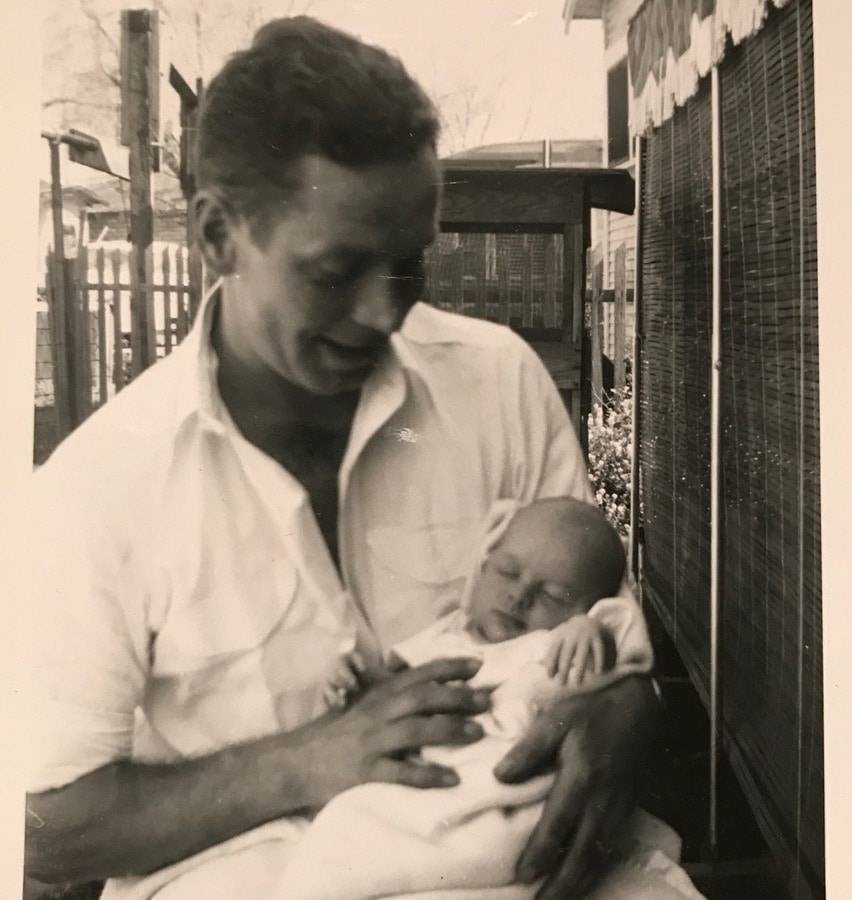My Dad, My Hero

Harold W. Van Gorder holding Chris Van Gorder.
Throughout my life, I have had the privilege to meet many impressive and influential people who have served as role models for me, influencing my career and personal life in both small and profound ways.
I've met presidents, foreign leaders, scientists, leading physicians, business leaders and academics. Many of these people I consider friends and colleagues today.
But this time of year, with Father’s Day on the horizon, my thoughts turn to the one person in that category who plays a unique role in my life – my hero.
My dad, Harold W. Van Gorder, was none of the things I just mentioned earlier. In fact at his memorial service years ago when he died, only a small group of family and friends were on hand.
Born and raised in Canada, he (and my mother as well) dropped out of high school during the Great Depression to get a job and help support his family. He was the youngest in his family and had lost out on the educational opportunities that his older siblings had prior to the Depression.
During the Depression, he held a number of odd jobs and even became a railroad engineer for a while. He eventually joined the Canadian Army when Great Britain and thus the British Empire declared war on Germany. He served throughout the war and sustained a lifelong injury to his back – I know he suffered with that the rest of his life.
After World War II, he and my mother moved to Southern California with my adopted brother, and they eventually had twins, my brother and me.
Without a lot of education, he got a job as a milkman, delivering milk every early morning when milk was delivered door-to-door in glass bottles. Eventually the industry changed, and milk was bottled in cartons and sold in stores. When that happened, he was moved into the bottling factory where he worked the rest of his life. Along the way he and my mother each went back to adult high school and finished their high school educations.
My dad was a quiet man – very humble – and he loved to spend time with my brother and me. By the time we were born, my dad had worked for his employer long enough to have several weeks of vacation every year. He would save all of his vacation to take at once so we could load the car and go camping, sometimes packing up every day and driving to another place to camp. During these trips, he taught us how to survive in the wilderness.
What I did not realize at the time, but do today, was that he also was teaching us how to survive in life.
Among the many things he taught me was this: "Don't ever steal from the hand that feeds you." He meant many things by that but, in short, he wanted us to know that nobody owed us anything. No employer owed us a job; no one owed us an education, no one owed us the food we put on the table at night. He believed that it was a privilege to have any job and to work hard. It meant that we had to give all of our time and commitment while at work or school or anything else we tried, otherwise we would be stealing from the hand that feeds us.
But he didn't just say this, he meant it.
His milk bottling plant was located in downtown Los Angeles, and I remember him going to work on his night shift during the middle of the Watts Riots (or the Watts Rebellion) during 1965. I was terrified for him as there were buildings being burned very near his factory. But he reported to work anyway because he said he owed it to his employer, and there were children who needed the milk he bottled. I never forgot that.
My dad worked very hard for one reason, to put food on our table and to give my brother and me the education and opportunities he never had. He never complained. In fact, he was always remarkably humble, maybe even a little shy. He loved the United States and became a U.S. citizen, and he encouraged my brother and me to serve and give something back to our community. Not to take, but to give. That's why I joined the police force early in my professional life. It’s why I work in health care today. And it’s why I volunteer as a reserve deputy with the San Diego County Sheriff's Department today.
My dad died in his 60s from early onset Alzheimer's disease. The only time I ever saw my dad cry was when he received that diagnosis. Just a few tears, and that was it. He did the best he could without complaint the rest of his life.
Do I believe I've lived up to his ideals? I hope so, but I did not have to endure the economic hardships he had to go through, so I'm not sure I've been tested like he was. But I have tried to live up to his expectations. I hope my hero would be proud of how close I’ve come to meeting his hopes for me.